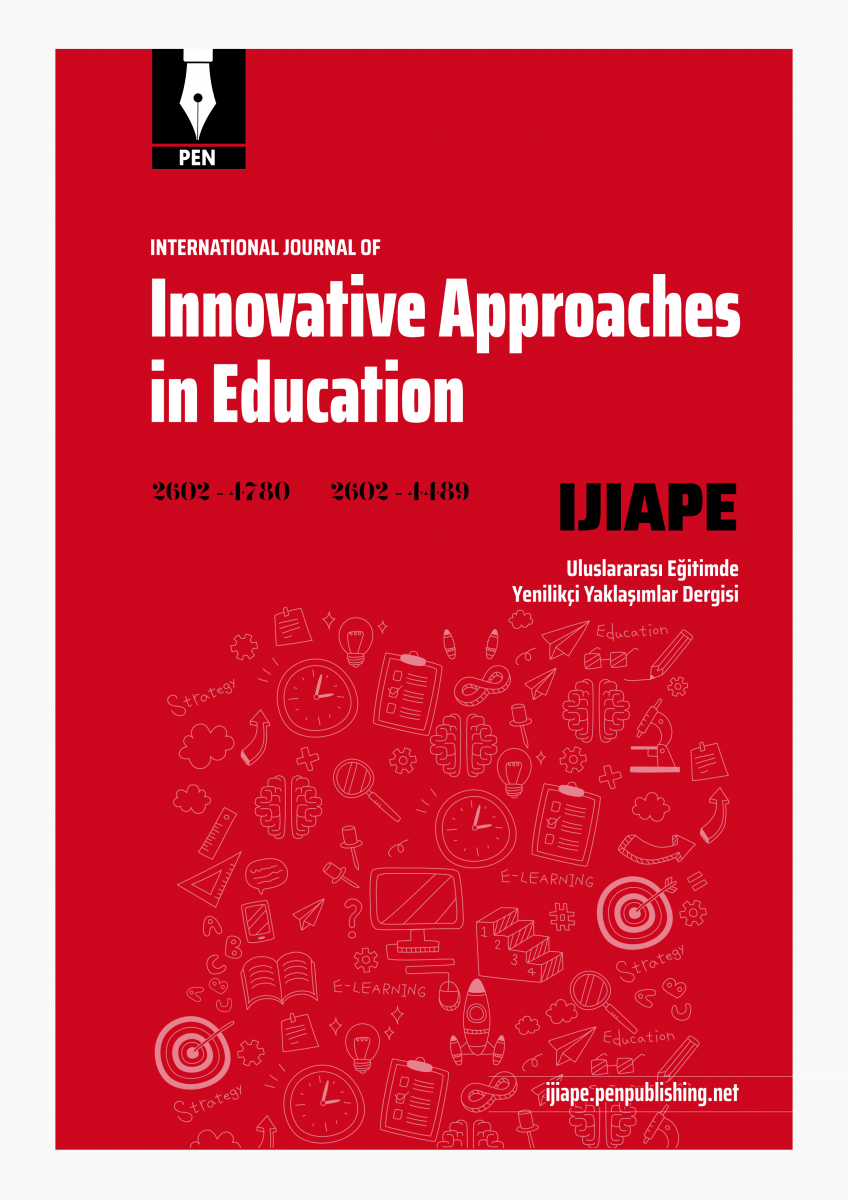- Akçay, A., Şahin, A. (2013). Bir Öğretim Yöntemi Olarak Web Macerası (WebQuest). Bilişim Teknolojileri Dergisi, 6(1). [Google Scholar]
- Akkoyunlu, B., (2002). “Educational Technology in Turkey: Past, Present and Future”. Educational Media International, 39 (2), 165-174. [Google Scholar]
- Algan, C. E. (2006). Özel Okullarda Görev Yapan Sınıf Öğretmenlerinin Eğitimde Bilgi Teknolojileri Kullanımı Öz-Yeterlilikleri ve Derslerinde Bilgi Teknolojilerinden Yararlanma Durumları. Yayınlanmış Yüksek Lisans Tezi, Eğitim Bilimleri Enstitüsü, BÖTE ABD, Marmara Üniversitesi, İstanbul. [Google Scholar]
- Alibec, C., Sandiuc, C. (2015). The Benefıts Of E-Learnıng Through WebQuest (Web Macerası). A Case Study. The 11th International Scientific Conference eLearning and Software for Education Bucharest, April 23-24 [Google Scholar]
- Alkan, C. (1997). Eğitim teknolojisi (5. Baskı). Anı Yayıncılık, Ankara. [Google Scholar]
- Anderson, T. (2003). “Getting The Mix Right Again: An Updated And Theoretical Rationale for İnteraction”. The International Review of Research in Open and Distance Learning, 4 (2). [Google Scholar]
- Arabacı, B., Polat, M. (2013). Dijital Yerliler, Dijital Göçmenler ve Sınıf Yönetimi. Elektronik Sosyal Bilimler Dergisi. 12(47):11-20. [Google Scholar]
- Aşkar, P. (1991). Bilgisayar Destekli Öğretim Ortamı. Eğitimde Nitelik Geliştirme, Eğitimde Arayışlar 1. Sempozyumu Bildiri Metinleri, s. 174-177, İstanbul. [Google Scholar]
- Requirements for the Degree of Master of Education University of Prince Edward Island. [Google Scholar]
- Çakır, C. (2004). Anlamın Bağlam Açısından İncelenmesi: Kökanlambilim ve Artanlambilim. Gazi Eğitim Fakültesi Dergisi,24(3):245-255 [Google Scholar]
- Çakır, R. & Yıldırım, S. (2009). Bilgisayar öğretmenleri okullardaki teknoloji entegrasyonu hakkında ne düşünüyor? İlköğretim Online, 8(3), 952-964. [Google Scholar]
- Çiftçi, S. (2018). Sınıf Öğretmenlerinin İlk Okuma Yazma Öğretimi ve Bu Süreçte Kullanılan Kitaplara Yönelik Görüşleri. Akdeniz Üniversitesi Eğitim Bilimleri Enstitüsü Yayımlanmış Yüksek Lisans Tezi. Antalya. [Google Scholar]
- Demir, K. (2006). Dördüncü Ve Beşinci Sınıf Öğrencilerinin Sosyal Bilgiler Derslerinde Eleştirel Düşünme Düzeylerinin Çeşitli Değişkenler Açısından İncelenmesi. Gazi Üniversitesi Eğitim Bilimleri Enstitüsü Yayımlanmış Doktora Tezi Ankara. Tez No:187631 [Google Scholar]
- Fisch, K., McLeod, S. (2007). Did you know? [Video]. http://www.youtube.com/watch?v=pMcfrLYDm2U adresinden alınmıştır. [Google Scholar]
- Güven, İ. (2001). Öğretmen Yetiştirmenin Uluslararası Boyutu. Milli Eğitim Dergisi, 150, 20-27 [Google Scholar]
- Hacıfazlıoğlu, Ö., Karadeniz, Ş. & Dalgıç, G. (2010). Eğitim yöneticileri teknoloji liderliği öz-yeterlik ölçeğinin geçerlik ve güvenirlik çalışması. Kuram ve Uygulamada Eğitim Yönetimi, 17(2), 145-166 [Google Scholar]
- Hassanien, A. (2006). Using WebQuest to support learning with technology in higher education. Journal of Hospitality, Leisure, Sport, and Tourism Education, 5(1), 41–49. [Google Scholar]
- Huberman, M., Miles, M. (Ed) (2016). Nitel veri analizi. Ankara: Pegem Yayıncılık. [Google Scholar]
- Kaban Kadıoğlu, Z. (2013). Teknoloji Çağında E- Tüketim ve Genç Tüketicilerin Değişen Tüketim Algıları. AJIT‐e: Online Academic Journal of Information Technology, 4(13). http://www.ajit‐e.org/?menu=pages&p=details_of_article&id=42 [Google Scholar]
- Karasar, N. (1999). Bilimsel araştırma yöntemi. Nobel Yayın Dağıtım. [Google Scholar]
- Katırcı, E. (2010). Farklı Çoklu Ortamların Öğrencilerin Mekanik Konusundaki Kavram Yanılgılarının Giderilmesine Ve Bilişsel Yüklenmelerine Etkilerinin İncelenmesi: Görsel-Uzamsal Zekâ Boyutunda Bir Analiz. Yayınlanmış yüksek lisans tezi, Marmara Üniversitesi Eğitim Bilimleri Enstitüsü, İstanbul. [Google Scholar]
- Kirk, J. & Miller, M. L. (1986). Reliablity and validity in quantitie research. Beverly Hills, CA: Sage [Google Scholar]
- Kranzberg, M. (1995). Technology and History: “Kranzberg’s Laws”. Bulletin of Science, Technology & SocietyJournal. 15(1):5-13. https://journals.sagepub.com/doi/10.1177/027046769501500104 [Google Scholar]
- Lenhart, A., Madden, M., Macgill, A.R., & Smith, A. (2007). Teens and social media: The use of social media gains a foothold in teen life as they embrace the conversational nature of interactive online media. Pew Internet & American Life [Google Scholar]
- Lindstorm, M. (2003). Brand child. CSA Yayın Ajansı, Çev. Aytül Özer, Duygu Günkut, İstanbul [Google Scholar]
- McDermott, J. (1981). Technology: theopiate of the intellectual’s technology and man’s future. New York: St. Martin’s press. [Google Scholar]
- Mercan, M., Filiz, A., vd. (2009). Bilgisayar Destekli Eğitim ve Bilgisayar Destekli Öğretimin Dünyada ve Türkiyede Uygulamaları. 11. Akademik Bilişim Konferansı Bildirileri. 11-13 Şubat 2009 Harran Üniversitesi, Şanlıurfa [Google Scholar]
- Oblinger, D. G., ve Oblinger, J. L. (2005). Educating the net generation.Available from www.educause.edu/educatingthenetgen/ [Google Scholar]
- Prensky, M. (2003). Has growing up digital and extensive video game playing affected younger military personnel’s skill sets? Paper presented at the I/ITSEC 2003 [Google Scholar]
- Prensky, M. (2001a). Digital Natives, Digital Immigrants. From On the Horizon (MCB University Press, Vol. 9 No. 5, October 2001). [Google Scholar]
- Prensky, M. (2001b). Do they really think differently? Published in on the horizon (NCBUniversity Press, Vol. 9 No. 6, December 2001). [Google Scholar]
- Prensky, M. (2004). The Emerging Online Life of the Digital Native: What they do differentl because of technology and how they do it. The Emerging Online Life Of The Digital Native. [Google Scholar]
- Prensky, M. (2005). Listen to the Natives. Educational Leadership. Learning in the Digital Age, 63(4): 8-13. [Google Scholar]
- Rıza, E. (2003). Eğitim Teknolojisi Uygulamaları ve Materyal Geliştirme. Nadir Kitap.izmir. ISBN: 975-96446-1-4-448. [Google Scholar]
- Simina, O. (2005). Next in the line: Romanians at the gate of the EU. SISEC Discussion Papers No: II/1 [Google Scholar]
- Tavşancıl, E. Aslan, E. (2001). İçerik analizi ve uygulama örnekleri. Epsilon Yayınları: İstanbul [Google Scholar]
- Tonta, Y. (2009). Dijital Yerliler, Sosyal Ağlar ve Kütüphanelerin Geleceği. Türk Kütüphaneciliği 23(4):742-768. [Google Scholar]
- Tuti, S. (2005). Eğitimde Bilişim Teknolojileri Kullanımı Performans Göstergeleri, Öğrenci Görüşleri ve Öz-Yeterlik Algılarının İncelenmesi. Yayınlanmış Yüksek Lisans Tezi, Fen Bilimler Enstitüsü, BÖTE ABD, Hacettepe Üniversitesi, Ankara. [Google Scholar]
- Türkçe Sözlük-10. Baskı- (Türk Dil Kurumu 2005 Basım) [Google Scholar]
- www.tuik.gov.tr/PreHaberBultenleri.do?id=21779 [Google Scholar]
- www.mebbis.meb.gov.tr [Google Scholar]
- Yıldırım, A. (1999). Nitel araştırma yöntemlerinin temel özellikleri ve eğitim araştırmalarındaki yeri ve önemi. Eğitim ve Bilim Dergisi, [Google Scholar]
- 23(112): 7-17. [Google Scholar]
- Yılmaz, İ. (2006). Eğitim Fakültesinde Eğitim Görmekte Olan Öğretmen Adaylarının Bilgisayar ve Internet Kullanımına Yönelik Tutumların Belirlenmesi. Yayımlanmış Yüksek Lisans Tezi, Manisa Celal Bayer Üniversitesi [Google Scholar]
|

